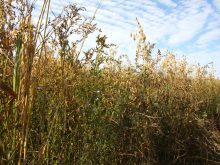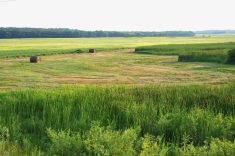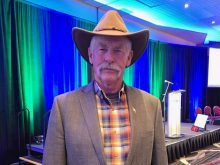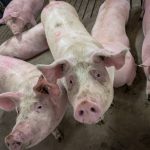[UPDATED: June 13, 2023] Several farmers from Manitoba and Saskatchewan say they are out thousands of dollars after subscribing to a carbon credit program offered by Farmers Edge.
“We have not seen a dime,” said Barclay Uruski, who farms near Arborg, Man.
Why it matters: Carbon credits have been touted as a way for farmers to be paid for the ecological services their operations provide.
Read Also

Horse live export ban on back burner
Animal welfare groups still hope Canada’s Parliament will ban the export of live horses for slaughter, a topic back in the news due to a recent court case in Manitoba.
Farmers Edge is a Manitoba-based firm that provides digital farm management tools. It launched its Smart Carbon program in 2021, which it said would allow farmers to turn current and new agronomic practices into sellable carbon credits.
According to the Farmers Edge’s website, the program involves simplified and automated data collection through on-farm hardware and sensors. Data is “aggregated on behalf of all farmers in the program to calculate the carbon credits generated.”
It also touts an “aggregated approach for maximum returns.”
Uruski said he has used Farmers Edge’s products for four years. He had decided to unsubscribe, when a Farmers Edge representative asked him to consider joining the Smart Carbon program instead.
“Basically, you will profit and Farmers Edge won’t cost you anything,” Uruski said he was told. “[Farmers Edge] will sell your carbon credits and your nitrogen management.”
The representative sent the farm a proposal. The document, which Uruski provided to the Co-operator, shows a projected income of just over $6,600 for “historical smart carbon revenue” and nearly $6,800 in “total combined yearly smart carbon revenue.”
The document said figures were an “estimated amount, subject to qualification and if carbon credits are selling at $20/tonne.”
Uruski was under the impression that he could expect a cheque at the end of the year, so he agreed to try the program. He expected that he wouldn’t have to pay for his subscription, though he noted this wasn’t communicated clearly.
The cheque didn’t come. Uruski said Farmers Edge told him, “it’s coming. It’s getting better. You’re going to get more money.”
He was surprised when he received a bill for his subscription. He paid for half and said he wouldn’t pay the rest until he saw the expected cheque.
Two years later, Uruski says he has not received a cheque and Farmers Edge has threatened to take him to a collection agency over the remaining half of his subscription. He said he’s received no explanation for why he hasn’t been paid for his credits.
Uruski posted to farmers’ forums on Facebook, and realized he wasn’t the only one in this situation.
Nathan Allard-Bean, who farms near Rouleau, Sask., told the Co-operator that he enrolled in the Smart Carbon program in 2022. He expected to get Farmers Edge services for free in exchange for the credits.
“We had no skin in the game,” Allard-Bean said.
He said he was told Farmers Edge could give him credits for the past four years. The firm suggested he would get $1.50 to $2 per acre on his 12,000-acre farm and he was under the impression that it would give him a cheque for those credits.
“It was promised at a certain time, then another time, and then another time and then no answer,” Allard-Bean said.
He said he hasn’t been able to reach any of his eight Farmers Edge contacts since February and he’s not sure if those employees work there anymore.
Phil Greenwood, who farms near Kisbey, Sask., said he enrolled in the carbon credit program in spring 2022. In a conversation via text message, Greenwood said he signed on with the understanding that credits would pay for the use of weather stations, soil sampling and variable-rate services.
Greenwood said it was his understanding that “we would still be receiving thousands of dollars in net credits after paying for these services.” He was surprised when he received several invoices.
He phoned Farmers Edge and was told to “ignore it for now,” he told the Co-operator. Verbally, he was told he would pay after Farmers Edge paid him for the credits, Greenwood said.
“A few months later, another bill — I believe over $100,000,” he said. “They said I could ignore the $35,000-part as long as I paid the $70,000.”
An email shared with the Co-operator shows Greenwood had more than 19,000 acres contracted to Farmers Edge. When Greenwood asked why his credits wouldn’t pay for his services, he was told “they won’t sell the carbon credits at this time due to current values.”
Greenwood wanted out of the program but was told he couldn’t exit without paying what he describes as “a huge penalty.”
Positive stories
Not all farmers have had bad experiences, however. Korey Peters, who farms near Steinbach, said his only complaint is the reams of paperwork. The Farmers Edge employee his farm dealt with was “very helpful,” he said.
Peters said his farm paid up front for the weather station services it received and expected to be reimbursed when the carbon credits sold. The Farmers Edge representative has kept in touch with him, and though he doesn’t believe the farm been paid yet (another family member deals with Farmers Edge), he said he’s not worried.
The credit system
It’s not clear why unhappy farmers have not seen the returns they expected. Farmers Edge did not respond to questions sent by the Manitoba Co-operator.
The carbon credit market is unregulated, and prices have been volatile. The average price of credits on the global voluntary carbon market climbed nearly 60 per cent throughout 2021, according to an August 2022 report from Ecosystem Marketplace. The average price of agriculture-related credits was US$8.81 per ton, the highest price across all categories, though actually a 10 per cent decrease from 2020 prices.
Nature-based credits (of which agricultural credits count), have seen a drop in price over the past year, said Kate Ervine, an associate professor at Saint Mary’s University in Nova Scotia. Ervine has studied carbon markets extensively.
Several reports showed that some carbon credit standards bodies approved inappropriate projects, or those that were not actually providing promised benefits, Ervine said. That, in turn, lowered demand for nature-based credits, affecting price.
None of the farmers interviewed by the Co-operator were aware of a contractual deadline by which their credits were meant to be sold, though some weren’t sure. The company is not legally obligated to include a deadline in its contracts.
“It’s not regulated,” Ervine said. “People who don’t really know about the market, they’re in a vulnerable position.”
There’s a lot of chatter in the voluntary carbon space on how to tackle this issue, she added said.
For those interested in the voluntary carbon market, Ervine advised spending extra time to understand the system or speaking with verification bodies, though she acknowledged these bodies might have a vested interest. She suggested local academics might offer unbiased opinions.
“That’s just ad hoc, so I don’t think that’s the solution,” she said. “Project developers can promise a lot, and if you don’t know the market or understand it, then it sounds really good. Then you find out after that you didn’t have any guarantees.”
*Update: The sentence about Korey Peters’ payment to Farmers Edge was updated for clarity.


















